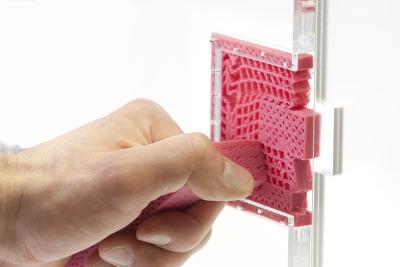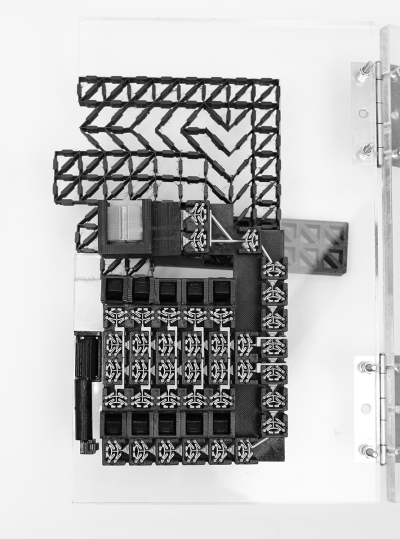Related People
Alexandra Ion
Ion Receives NSF CAREER Award for Material-Changing Interfaces
CAREER Award is National Science Foundation’s Most Prestigious Recognition for Young Faculty
Imagine a hard floor that adapts to cushion the impact of your fall, or a chair that adjusts its firmness and ergonomic support based on your seated posture. Carnegie Mellon University faculty member Alexandra Ion is developing a future where everyday objects like these intuitively respond to human needs.
Now, her work to make adaptive physical interfaces a reality comes with the support of the National Science Foundation, which honored Ion with its Early Career Development Program (CAREER) Award, the foundation’s most prestigious for young faculty members. Ion will receive $650,000 over the next five years to investigate materials with innovative microstructures that can dynamically change their properties in response to human interaction
Ion, the the Sara Kiesler Assistant Professor in the Human-Computer Interaction Institute in CMU’s School of Computer Science, leads the Interactive Structures Lab — an interdisciplinary lab with a unique blend of strengths in human-computer interaction (HCI), computational geometry, engineering and design. The lab is well positioned to investigate mechanical metamaterials with an HCI perspective.
“While microstructures have been investigated in engineering disciplines, I plan to focus on a deeper understanding of their human-centered qualities,” Ion said. “Currently we are used to the materials of our daily objects remaining static, rather than adapting to changes. Think of your sofa being the same firmness, your tables, floors, cups, etc. We will focus on how adaptive materials can provide utility to users, formulate design guidelines, develop generative design tools and shared resources, and evaluate our implementations through user studies.”
This project will advance the field of shape-changing interfaces in HCI, and the insights will have broad applications for a variety of other disciplines, such as mechanical engineering, soft robotics and interaction design.
“One current challenge of shape-changing interfaces is the lack of small, powerful and fast actuators. I plan to focus on self-actuation without the need for batteries or actuators,” Ion said. “My team and I are investigating how to make the material properties dynamic without the need for actuation. Rather, we use the humans’ grasp or other interaction as input. By focusing on the passive design of the material’s microstructure, we can start at the cellular level to create highly customizable, programmable and adaptable materials.”
The potential benefits to society span a wide range of applications, and could include responsive and ergonomic furniture design and personalized assistive braces that adapt for rehabilitation.
The NSF CAREER Award places great importance on both advancing research and sharing resources through education. Ion’s work will establish a new design space and build shareable libraries of adaptive material structures, fostering innovation and expanding education in human-centered material design.
Ion earned her undergraduate and master’s degrees from the University of Applied Sciences Upper Austria at Hagenberg, and a Ph.D. from the Hasso Plattner Institute in Germany. Her work is published in top-tier HCI venues, such as ACM UIST and CHI, and is exhibited by prestigious museums, including a permanent exhibition at the Ars Electronica Center in Linz, Austria.

Research Areas




